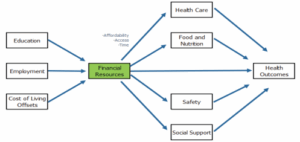
Chris Holman welcomes Karley Abramson, Research Associate-Health Policy, Citizens Research Council of Michigan, Livonia, MI, but working out of Lansing.
Watch Karley and Chris discuss how Michigan’s health challenges undermine workforce strength and long-term economic growth in the YouTube video shared below:
Welcome Karley, remind us about the Citizens Research Council of Michigan and your role at the CRC?
Your new report connects social determinants of health directly to Michigan’s economic performance. What should business leaders understand about how poor population health affects workforce productivity and long-term competitiveness?
Michigan’s health outcomes are lagging behind neighboring states and even international peers. From a business perspective, what are the cost implications—such as absenteeism, healthcare spending, and labor force participation—of failing to address these root causes?
The research shows a strong link between financial resources and health outcomes. How might Michigan employers play a role in improving these conditions through wages, benefits, or community investment strategies?
As the report highlights the interconnectedness of social determinants of health, what partnerships between the private sector and policymakers could most effectively improve health and economic prosperity statewide?
If Michigan wants to reverse deteriorating trends, what business-aligned policy changes or corporate practices does your research suggest could move the needle the fastest?
» Visit MBN website: www.michiganbusinessnetwork.com/
» Subscribe to MBN’s YouTube: www.youtube.com/@MichiganbusinessnetworkMBN
» Like MBN: www.facebook.com/mibiznetwork
» Follow MBN: twitter.com/MIBizNetwork/
» MBN Instagram: www.instagram.com/mibiznetwork/
Lack of Financial Resources Central to Michiganders Lagging Health Outcomes New Research:
Social Determinants of Health: Pathways to a Healthier Michigan
Livonia, MI, Nov. 18, 2025 – Citizens Research Council of Michigan today released exhaustive research that drills down to root causes of why Michiganders suffer from worse health outcomes than our fellow citizens in comparable, neighboring states, across the U.S., and among our international peers. The report, Social Determinants of Health: Pathways to a Healthier Michigan, outlines what Social Determinants of Health are and how they directly affect individual residents, Michigan’s economy, and the state’s future.
Two broad themes emerge from the data presented: the interconnectedness of the social determinants of health and the centrality of financial resources in the story of Michigan residents’ lagging health outcomes. “In every area of public policy, there is a nexus to health and well-being,” said Karley Abramson, health policy research associate. “When reviewing the ways in which social determinants of health intersect, the pathways can almost always be traced back to whether an individual has the necessary financial resources to achieve good health outcomes, but policies in all sorts of other areas influence whether a person can get what they need to be healthy.”
Financial Resources as Pathways to Health Outcomes

Policies in Michigan, like many other states, focus on the health care industry or individual health issues, but to impact health outcomes, policymakers need to consider a wider range of solutions, which is where Social Determinants of Health come in. The all-encompassing nature of Social Determinants of Health can make it difficult for policymakers to translate them into tangible actions. This report unpacks Social Determinants of Health by focusing on the evidence-based fundamental resources that are necessary for individual health: Financial Resources; Health Care; Food and Nutrition; Safety; and Social Support.
“Each of these categories covers a vast number of overlapping issues and their interconnectedness is central to any discussion about health policy,” said Eric Lupher, Citizens Research Council president. “The centrality of financial resources – education, employment, and income – is the story of Michigan’s lagging health outcomes.”









